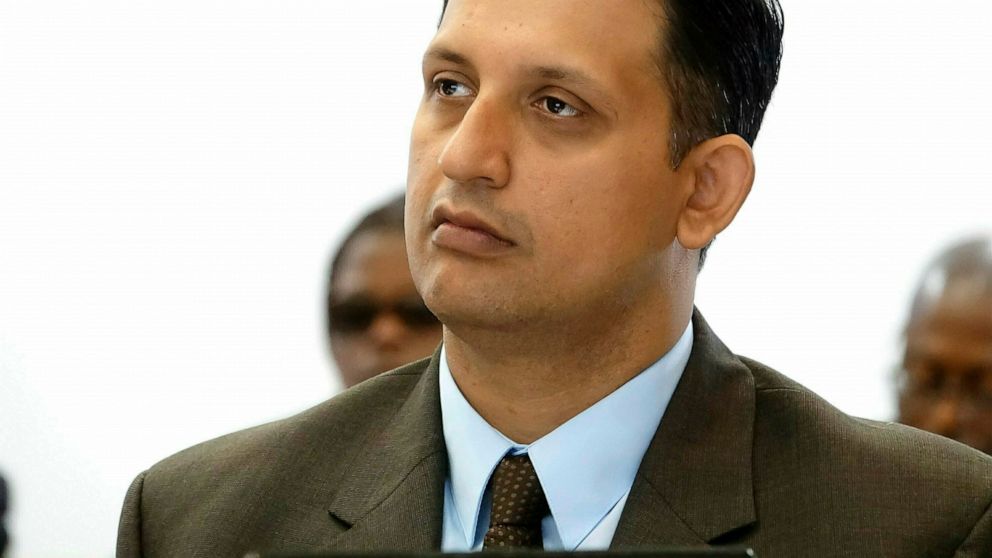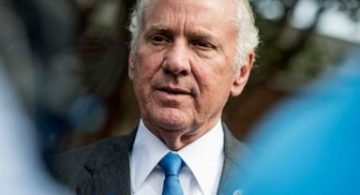
For the first time in nearly 30 years, a Florida police officer is set to be sentenced to prison Thursday for an on-duty fatal shooting — and he could be going away for life.
Former Palm Beach Gardens officer Nouman Raja faces a minimum of 25 years and Circuit Judge Joseph Marx could give him a life sentence for the 2015 shooting of Corey Jones, a 31-year-old African-American drummer whose SUV had broken down on an interstate early on a Sunday morning.
Raja, 41, was convicted last month of manslaughter and attempted first-degree murder for Jones’ death. Prosecutors said Raja, one of few police officers nationwide convicted of an on-duty shooting, escalated what should have been a routine interaction into a deadly confrontation.
After last month’s verdict, the Jones family and their attorney, Benjamin Crump, replied in unison when asked what sentence Raja should receive: “What Corey would have got if he shot Raja.” The officer, who had been on house arrest, was jailed after the verdict.
Marx has rejected motions by Raja’s attorneys to throw out the verdicts. They argued that the evidence didn’t support his conviction and that Marx should have instructed jurors to consider whether Raja’s use of force was justified under Florida’s “stand your ground” law. They plan to appeal.
The last Florida officer sentenced for an on-duty killing was Miami’s William Lozano in 1989. The Hispanic officer fatally shot a black motorcyclist who he said tried to hit him. A passenger died when the motorcycle crashed, setting off three days of rioting.
Lozano was convicted of two manslaughter counts in a Miami trial and sentenced to seven years, but he never served it. State appellate court justices dismissed the verdict, saying the case should have been moved from Miami because of racial tensions. Lozano was acquitted at a 1993 retrial in Orlando.
Raja, of Asian descent, was in plain clothes as part of an auto burglary investigation team when he spotted Jones’ SUV at 3:15 a.m. Oct. 18, 2015. Jones was returning home from a nightclub performance when his vehicle stalled. He had a concealed-weapons permit and carried a handgun, purchased days earlier to protect his $10,000 drum set, which was in the SUV.
Raja, wearing jeans, a T-shirt and a baseball cap, drove an unmarked van the wrong way up an off ramp and stopped a few feet from the broken-down vehicle.
Prosecutors said Raja never identified himself as an officer and acted so aggressively that Jones must have thought he was about to be carjacked or killed. Raja’s supervisor testified the officer had been told to don a police vest if he approached a civilian. He didn’t. Prosecutors also questioned why Raja didn’t pull his badge from his pocket.
What police didn’t know at first was that Jones had been talking to a tow-truck dispatcher on a recorded line. That recording shows Jones saying “Huh?” as his door opens. Raja yells, “You good?” Jones says he is. Raja replies twice, “Really?” with Jones replying “Yeah.”
Suddenly, Raja shouts at Jones to raise his hands, using an expletive. Jones replies, “Hold on!” and Raja repeats his demand.
Prosecutors believe Jones pulled his gun and tried to get away. Raja fired three shots; Jones ran down an embankment. Prosecutors said he threw his gun, but Raja fired three more times, 10 seconds after the first volley. Jones was killed by a bullet through his heart.
Prosecutors said Raja, not knowing of the tow-truck dispatcher recording, tried to deceive investigators. He claimed he said “Police, can I help you?” as Jones jumped from the SUV. He also told them Jones leapt backward and pointed his gun, forcing him to fire. Raja said Jones ran but turned and again pointed his gun, forcing him to fire the second volley.
Prosecutors charged Raja with manslaughter, saying his actions created the confrontation and showed “culpable negligence.” They also charged him with attempted murder, saying that although they couldn’t prove beyond a reasonable doubt which of Raja’s six shots killed Jones, the second volley was a conscious effort to kill him as he fled.





